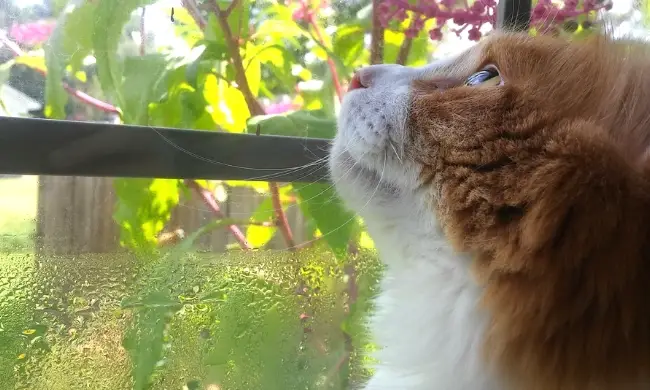 When you prepare for your indoor cat to go outside there are lots of things to do to prepare for a more successful outdoor life for your cat. Below I have put 15 things to do and think about before letting your indoor cat outside for the first time. Most of these need to be ticked whether or not your cat is going out as an indoor cat with some outdoor access or as an indoor cat that is going to be a full outdoor cat in the future.
When you prepare for your indoor cat to go outside there are lots of things to do to prepare for a more successful outdoor life for your cat. Below I have put 15 things to do and think about before letting your indoor cat outside for the first time. Most of these need to be ticked whether or not your cat is going out as an indoor cat with some outdoor access or as an indoor cat that is going to be a full outdoor cat in the future.
There are lots of things you can do to prepare your cat for life outside and to make it more successful. You can make sure you check your cat’s health, the safety of the surrounding areas and what type of outside access, if any, is right for your cat.
Below is a list of things that you might want to check and do before you show your kitty their new exciting world.
15 Things To Do Before Letting Your Indoor Cat Outside For The First Time
Below I have run through some of the things to think about and you might need to do before letting our cat out for the first time.
1. Is Your Cat Breed Meant to Be Indoors?
Some cat breeds are just not meant to go outside. They’ve had a lot of the cat aggression bread out of them. Ragdolls, for example, are meant to be indoor cats. If you have an indoor cat breed like this it is a good idea to check its suitability to outdoor life. If you wanted it to go outside it needs to be either in an enclosure or under supervision. It should never be allowed out purely on its own to wander free. This may result in the loss, injury or theft of your cat.
2. Have You Had Your Cat Long Enough to Go Outside?
When you have a new cat it should stay in the first few weeks until it gets used to you even if you intend it to be an outdoor cat. If you have an indoor kitten it should not go outside until it has had its vaccinations and been neutered or spayed. This is about 4-6 months. It should also stay in for about a week after the vaccinations. (Note: there are other things to think about for kittens this list is for cats)
3. Is Your Cat Neutered?
Before letting your cat outside make sure it is neutered or spayed. This is important for several reasons. You don’t want your female cat to get pregnant. And male unneutered cats are more aggressive and prone to wander further.
4. Has Your Cat Access to Safe Clean Water Outside?
 If your cat is unable to come back inside of its own free will because you have no cat flap for example, then it’s a good idea, in fact essential, that it should have fresh water at its disposal. Some people also recommend food and shelter. Whether you need this or not will really depend on your own personal circumstances in how long your cat is outside for.
If your cat is unable to come back inside of its own free will because you have no cat flap for example, then it’s a good idea, in fact essential, that it should have fresh water at its disposal. Some people also recommend food and shelter. Whether you need this or not will really depend on your own personal circumstances in how long your cat is outside for.
Putting food outside for your cat can cause additional issues. For example, it can attract other cats. If it’s soft food it could attract wasps. And it can also possibly attract rats or mice. In some areas, it may even attract foxes.
5. Does Your Cat have Shelter?
If you are leaving your cat outside for any length of time you may want to install some kind of shelter for it to reduce the chances of it hiding under cars.
6. Have You Installed Catios and Cat Enclosures?
If your cat is going to remain an indoor cat with some access is the area as secure and the structure as safe as possible? Are the walls high enough?
7. Have You Checked Your Area for Outdoor Hazards?
Unfortunately, there isn’t a lot you can do about hazards outside your own garden or yard but I have put together a list of those that might harm your cat some you have control over.
8. Do You Have a Cat Flap or V Outside Facilities?
If your cat is going to go outside on a regular basis and you can it might pay you to think about installing a cat flap. This will give your cat much more freedom to come and go as it pleases. It will also give it somewhere to come in if it feels threatened. And you won’t have to worry about the food outside. However, I recommend that you still put water outside for your cat.
9. Do You Think that Your Cats Temperament Suited to Being Outdoors?
Your cat’s temperament can also affect how successful it’s outside life is. If it is too aggressive you might find you get some too many flights and then stop in the vets on a long ongoing basis. On the other hand, if it’s too timid it can still end up in the vet because it’s ended up with too many fights. Some cats are too nervous to be outside.
10. Essential & Advised Vaccines for Cats
Disclaimer: Please note that I am writing this as general advice. However, I am not a vet trained. For which vaccines to get for your cat in your area please seek your vet’s advice as this will change depending on your country and your own personal circumstances.
If you want your cat to go outside it should be up to date with all of its vaccines. Some vaccines you will need to have regardless of where you live however other vaccines may be local to your area or country.
Feline infectious enteritis (FIE)
This is a really nasty virus (feline panleukopenia virus) that is a gut infection, it is really serious and can also be fatal to your cat
.
Cat ‘flu’
Cat flu is probably the most widely known virus for cats. It is vital you vaccinate against the two viruses (feline herpesvirus (FHV-1), (Rhinotracheitis (FVR) for the US) and feline calicivirus (FCV). Like flu for humans, there are other strains so these will cover most situations but not all.
Feline leukaemia virus (FeLV)
If your cat is to become an outdoor cat it is vital that you get this shot as the disease is fatal to your cats.
Feline chlamydophilosis
This causes conjunctivitis in cats it is best to chat with your vet to decide whether your cat should have this one.
Is Rabies a Possibility?
In some countries, you might want to also consider rabies shots. This is especially important if you live in the USA as there are a large number t of cats that carry it. In some states, it is a legal requirement.
If you have a chat with your vet they will let you know which of the shots that your cat should have for its particular circumstances.
11. Check If Your Cat Has FIV Cat Aids
If your cat has FIV It’s always advised that it does not become an outdoor cat. This does not mean your cat does not go out into a cat enclosure outside or a secure garden under supervision. Just that it cannot become a truly outdoor cat.
This is because FIV is transferred through cat bites so if your cat gets into a fight with another cat it can transfer the disease. Also, your cat is more vulnerable to infection due to this illness. Therefore is safer and more responsible for both your cat and the other cats that your cat stays in and is protected.
12. Does Your Cat Have Claws?
 If your cat doesn’t have any claws it should be an indoor cat because cats without claws are unable to defend themselves. Perhaps think about some limited and safe outside access for them.
If your cat doesn’t have any claws it should be an indoor cat because cats without claws are unable to defend themselves. Perhaps think about some limited and safe outside access for them.
Supervised or Unsupervised Outdoor Access
What are the things you need to decide is if your cat is going to be completely an outdoor cat or indoor cat with some outdoor access?
13. How Old is Your Cat?
If you have an older cat it may not be able to defend itself as much as a younger one and may prefer to stay closer to home with some outdoor access. Check if your cat will be happier closer to home.
14. Check Your Insurance
Might also be a good idea if you haven’t already done so to insure your cat. If you already have your cat insured as an indoor cat it might pay to have a look at the terms of your insurance cover to make sure that it covers your cat now that it’s an outdoor cat. If you need to inform them and you haven’t as it may void your insurance cover.
15. Is Your Cat Microchipped in Case of Loss
Have you had your cat microchipped in case it does get lost or out of its enclosure? This is essential even if you decide to have a collar.
Now You Are Ready to Let Your Cat Out
You are now ready to let your cat outside. There is a process you can follow to make this transition easier for your cat. All cats are different and some will take longer than others. While some may never adapt, most do and they love it outside even if they are limited to your garden area.